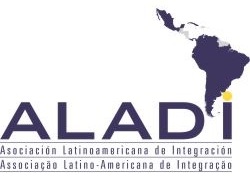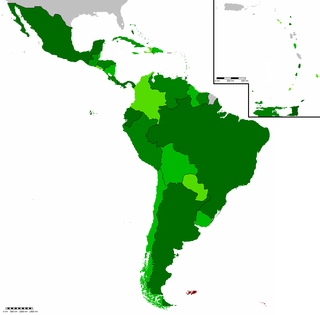
The Latin American Integration Association / Asociación Latinoamericana de Integración / Associação Latino-Americana de Integração is an international and regional scope organization. It was created on 12 August 1980 by the 1980 Montevideo Treaty, replacing the Latin American Free Trade Association (LAFTA/ALALC). Currently, it has 13 member countries, and any of the Latin American States may apply for accession.

The Andean Community is a free trade area with the objective of creating a customs union comprising the South American countries of Bolivia, Colombia, Ecuador, and Peru. The trade bloc was called the Andean Pact until 1996 and came into existence when the Cartagena Agreement was signed in 1969. Its headquarters are in Lima, Peru.

The Union of South American Nations (USAN), sometimes also referred to as the South American Union, abbreviated in Spanish as UNASUR and in Portuguese as UNASUL, is an intergovernmental regional organization set up by Hugo Chavez to counteract the influence of the United States in the region. It once comprised twelve South American countries; as of 2019, most have withdrawn.
A continental union is a regional organization which facilitates pan-continental integration. Continental unions vary from collaborative intergovernmental organizations, to supranational politico-economic unions. Continental unions are a relatively new type of political entity in the history of human government. Throughout most of human history, political organization has been at the local level and in more recent centuries, the sub-regional ("regional")/sub-continental level ; however, starting with the advent of better transportation, weapons and communication there was for the first time the ability for a union of member states to organize at the continental level. After the devastation of the First and Second World Wars in the middle of the twentieth century, Europe began to slowly integrate with the founding of the "European Community", which became a political union covering much of the European continent.

ALBA or ALBA–TCP, formally the Bolivarian Alliance for the Peoples of Our America or the Bolivarian Alliance for the Peoples of Our America – Peoples' Trade Treaty, is an intergovernmental organization based on the idea of political and economic integration of Latin American and Caribbean countries.

The Andean Parliament is the governing and deliberative body of the Andean Community, conformed by representatives of its four member states Bolivia, Colombia, Ecuador and Peru, and one associate member, Chile. It is composed of 25 parliamentarians, five representing each state.

The Latin American Parliament (Parlatino) is a regional, permanent organization composed by the countries of Latin America and the Caribbean. It is a consultative assembly similar to the early European Parliament. Currently the institution is being considered to become the legislative organ of the Community of Latin American and Caribbean States.

The Argentina–Brazil relationship is both close and historical, and encompasses the economy, trade, culture, education, and tourism. From war and rivalry to friendship and alliance, this complex relationship has spanned more than two centuries. The countries also share a system of government, a federal republic with a presidential system.

The Mercosur Parliament, known also as Parlasur, or Parlasul, is the parliamentary institution of the Mercosur trade bloc. It is composed of 81 MPs, 18 from each member states of the bloc – Argentina, Brazil, Paraguay and Uruguay – and 9 from applying member Venezuela. Associate members – Bolivia, Chile, Colombia, Ecuador and Peru – may also hold seats in the Parliament, but with no voting powers.
The UNASUR Constitutive Treaty, officially the Constitutive Treaty of the Union of South American Nations, was signed on May 23, 2008 during the extraordinary summit of heads of state and government of the Union of South American Nations (UNASUR) held in Brasília, Brazil. It officially established the Union of South American Nations, an intergovernmental continental union of all twelve South American nations.

The Southern Common Market, commonly known by Spanish abbreviation Mercosur, and Portuguese Mercosul, is a South American trade bloc established by the Treaty of Asunción in 1991 and Protocol of Ouro Preto in 1994. Its full members are Argentina, Brazil, Paraguay and Uruguay. Venezuela is a full member but has been suspended since 1 December 2016. Associate countries are Bolivia, Chile, Colombia, Ecuador, Guyana, Peru, and Suriname.
The Summit of South American-Arab Countries is a bi-regional mechanism for cooperation and political coordination, which gathers the 22 member-States of the League of Arab States and the 12 countries of South America. Better known by its Portuguese and Spanish acronym ASPA, the bi-regional forum was created upon proposal of the Brazilian President Luiz Inácio Lula da Silva, during the I ASPA Summit of Heads of State and Government, held in Brasilia, Brazil, in May 2005. Since its inception, a second ASPA Summit happened in Doha, Qatar, in March 2009, and a third Summit was held in Lima, Peru, in October 2012, after being postponed, from February 2011, due to the Arab Spring uprisings.

The Community of Latin American and Caribbean States (CELAC) is a regional bloc of Latin American and Caribbean states proposed on February 23, 2010, at the Rio Group–Caribbean Community Unity Summit, and created on December 3, 2011, in Caracas, Venezuela, with the signing of the Declaration of Caracas. It consists of 33 countries in Latin America and the Caribbean and has five official languages.
The Secretary General of the Union of South American Nations is the legal representative of the Secretariat of the Union of South American Nations (USAN).

The 2010 South American summit, took place in Georgetown, Guyana on November 26, 2010. Eight heads of state and four foreign ministers of the Union of South American Nations attended the summit. During the summit, the leaders signed an additional protocol to the Constitutive Treaty, adding a democratic clause to the charter of the organization. The Georgetown summit ended with the Ecuadorian president handing the UNASUR pro-tempore presidency for the next twelve months to his Guyanese counterpart, Bharrat Jagdeo.
The integration of Latin America has a history going back to Spanish American and Brazilian independence, when there was discussion of creating a regional state or confederation of Latin American nations to protect the area's newly won autonomy. After several projects failed, the issue was not taken up again until the late 19th century, but now centered on the issue of international trade and with a sense of pan-Americanism, owing to the United States of America taking a leading role in the project. The idea of granting these organizations a primarily political purpose did not become prominent again until the post-World War II period, which saw both the start of the Cold War and a climate of international cooperation that led to the creation of institutions such as the United Nations. It would not be until the mid-20th century that uniquely Latin American organizations were created.

Ricardo Armando Patiño Aroca is an Ecuadorian politician who has served as Minister of Foreign Affairs of Ecuador from 2010 until 2016, under the government of President Rafael Correa. Previously he was Minister of Finance and Minister of the Coast. He is one of the ideologists of The Citizens' Revolution who with Correa wanted to gradually introduce a democratic socialist government in Ecuador. On 4 March 2016, he was named as Defense Minister by President Correa.
Alberto A. Guani Amarilla is a Uruguayan diplomat.

Mercosur Cities Network, or simply Mercocities, is a network that unites a group of municipalities of the countries that participate in the Common Market of the South (Mercosur), whether they are members or associates. This organization of cities aims to promote their integration on a regional scale and stimulate development and cooperation between them.

The Forum for the Progress and Integration of South America is an initiative by Sebastián Piñera and Iván Duque, for the creation of an integration body to replace the Union of South American Nations.
















